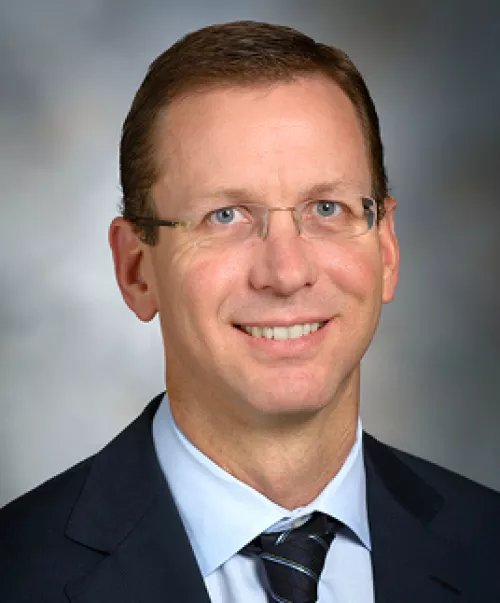John F. de Groot, MD, will become the next Division Chief of the Neuro-Oncology Division within the Department of Neurological Surgery at UCSF.
Dr. de Groot joins UCSF from MD Anderson Cancer Center in Houston, where he most recently served as Director of Clinical Research in Neuro-Oncology (2013-2021) and Interim Chair of the Department of Neuro-Oncology (2015-2020). He has been a faculty member at MD Anderson since 2004, after completing a neuro-oncology fellowship there. He completed his neurology residency at Johns Hopkins University and received his medical degree from the University of Texas Medical Branch at Galveston.
He is a celebrated educator, serving as Director of the Neuro-Oncology Fellowship program at MD Anderson for eight years. During his tenure he co-chaired the committee to develop the Neuro-Oncology Fellowship Match launched by the Society for Neuro-Oncology in 2017. Dr. de Groot has mentored countless junior faculty, clinical fellows, postdoctoral research fellows, residents, medical students and undergraduate students; inspiring the next generation of innovative clinical and basic science research.
Here he talks about the importance of learning from every patient and a field poised on the brink of major breakthroughs.
The Best Part of Being at UCSF
Coming to UCSF is very exciting to me for several reasons. First and foremost, I believe the strength of UCSF is its people. I am incredibly excited to work closely with the many brilliant, innovative, motivated, and compassionate people at UCSF. From the most senior members of leadership to the dedicated research staff – I am looking forward to joining such talented people who are energized, inspired and patient-focused, and working together as a team to cure brain cancer.
The basic and translational imaging program at UCSF is world class. Diagnostic imaging is an incredible tool for helping us evaluate brain tumors in order to determine how best to treat our patients’ disease. Cutting-edge research in some traditional imaging modalities has led to their adaptation as adjuvant therapeutic devices, such as MRI-guided ultrasound. UCSF is at the forefront of these developments. The ability to incorporate leading-edge imaging-based correlative endpoints into clinical trials is an enormous advantage that strengthens the potential for trials to reach meaningful outcomes and increases our capacity to learn from and optimally treat every patient.
There are multiple opportunities for significant innovation occurring in our basic science laboratories. There is a huge breadth of groundbreaking, early-stage research at UCSF that is ripe for translation into novel therapeutics that will transform the lives of patients. I am enthusiastic to take part in this endeavor and to further that goal.
My clinical work is a constant reminder of the privilege and responsibility entrusted in me to care for this truly unique patient population. It is an honor to join the clinical care team of neurosurgeons, radiation oncologists, neuro-oncologists and supportive care specialists at UCSF creating an incredible environment to offer the best care in the world for patients with tumors of the brain and spine.
Clinical Trial Collaboration
A big part of my practice at MD Anderson and a very rewarding part of my job has been working with pharmaceutical and other biotechnology companies to develop clinical trials for new therapies. I am excited to return to the Bay Area, a well-known hub for innovative biopharma where I gained my own early research education, and to leverage my experience growing partnerships with industry to further expand the clinical trials portfolio at UCSF.
The Next Big Thing
I believe the field of immunotherapy will be where we see the next big advances in the treatment of patients with brain cancer. There are many exciting therapies in early use and development, from various checkpoint inhibitors to CART-cell constructs. While it’s too early to predict which approach will lead to the most meaningful improvements in outcomes, I think this is an extremely promising area of clinical research.
One of the first trials I’ll be developing at UCSF will involve focused ultrasound that disrupts the blood-brain barrier in combination with immunotherapies. This is a novel technology with interesting correlative biology to explore. For example, circulating tumor DNA in the blood is significantly increased when the blood-brain barrier is transiently interrupted with focused ultrasound. This provides us a minimally invasive method to assess tumor burden, which can be correlated with the immune cell repertoire and tumor immune microenvironment and ultimately lead to better treatments for patients.

